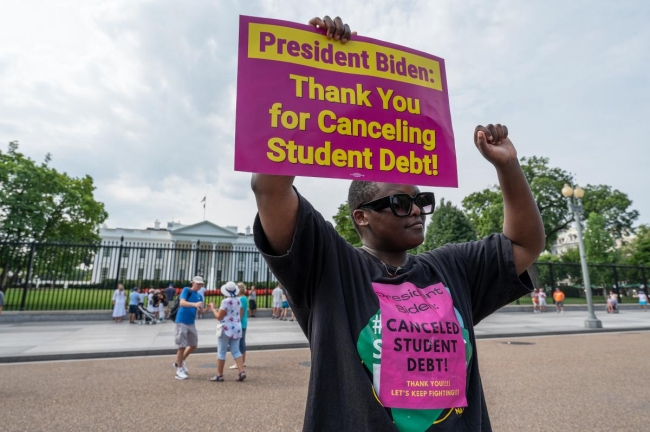You have /5 articles left.
Sign up for a free account or log in.

Advocates praised the Biden administration’s plan to forgive some student loans, but legal concerns and challenges are prompting changes to the plan.
Craig Hudson for The Washington Post via Getty Images
In a move that could affect millions of people, federal student loans not held by the U.S. Department of Education will no longer be eligible for debt relief, the department quietly announced Thursday.
When President Biden last month announced plans to forgive up to $20,000 in federal student loans for eligible Americans, the department didn’t definitively say whether privately held federal student loans would be included in the plan but said that it was discussing the issue with private lenders. Now, those borrowers have an answer: their loans will not be forgiven.
“ED is assessing whether there are alternative pathways to provide relief to borrowers with federal student loans not held by ED, including FFEL Program loans and Perkins Loans, and is discussing this with private lenders,” the department wrote in its updated FAQ about the debt-relief plan.
The department had encouraged borrowers with privately held federal student loans, including those with Federal Family Education and Perkins Loans, to apply for consolidation into the Direct Loan program, but now only those who applied for this process before Thursday will be eligible for loan forgiveness.
A department spokesman said in a statement to media outlets that the goal “is to provide relief to as many eligible borrowers as quickly and easily as possible, and this will allow us to achieve that goal while we continue to explore additional legally available options to provide relief to borrowers with privately owned FFEL loans and Perkins loans, including whether FFEL borrowers could receive one-time debt relief without needing to consolidate … The FFEL program is now defunct and only a small percentage of borrowers have FFEL loans.”
More than four million borrowers have $108.8 billion in outstanding Federal Family Education Loans held by commercial lenders, according to federal data. About 9.38 million Americans have loans through this program over all. The Biden administration originally said about 43 million people would receive some relief under the plan, which would forgive up to $20,000 in student loans for eligible Americans. The application for debt relief is supposed to open next month.
Politico, which broke the news, reported that lenders involved with the federal student loan program were seen as the greatest legal threat to Biden’s plan. If borrowers converted their loans to a Direct Loan held by the Education Department, that would mean a loss for the lenders who previously held the loans.
“Top Education Department officials and industry groups had for weeks been negotiating a compromise deal in which the companies were compensated for their losses and avoid suing the administration over the issue,” Politico reported. “But those discussions have not yet produced a deal.”
The department’s move comes as the Biden administration is facing legal challenges to its plan. On Thursday, six largely Republican-led states filed a single lawsuit seeking to block the plan, arguing that President Biden doesn’t have the authority to forgive debts and that the plan would cause harm to the states. The lawsuit is the second filed this week to challenge the plan’s legality.
Missouri, one of the states involved in the lawsuit, is a servicer of the Family Federal Education Loan Program via the Missouri Higher Education Loan Agency. The suit argues that debt-relief plan deprives the agency of revenue from the loans it holds.
“The mass debt cancellation has created an enormous incentive to consolidate FFELP loans not held by ED (which are not currently eligible for cancellation) into DLP loans (which are eligible for cancellation),” the lawsuit states. “The inevitable result is that FFELP loan borrowers will likely consolidate into DLP loans en masse.”
The agency uses the Federal Family Education Loans on its books as security on bond offerings, according to the suit.
The other states suing are Arkansas, Iowa, Kansas, Nebraska and South Carolina.
“The lawsuit that was filed is about how lenders are making money off of these borrowers’ pain and debt, and that’s what this lot like at the heart of this lawsuit,” said Persis Yu, policy director for the Student Borrower Protection Center. “That’s what this is about—making sure that these borrowers are able to stay in debt so that these lenders can make money.”
Yu thinks the department’s decision not to extend debt relief to those with privately held Federal Family Education Loans and Perkins Loans will have a similar effect.
“This is the kind of action that lenders want,” Yu said. “They want to keep people in debt.”
Yu said the FFEL and Perkins borrowers are often left out of other relief programs such as the payment pause over the last two years and the income-driven repayment program, and they are in “desperate need of relief.” She hopes the administration will find a solution for this group soon.
“Lenders and servicers are really trying to twist the arm of the administration to deny relief to borrowers, and I think that’s really tragic,” Yu said.




